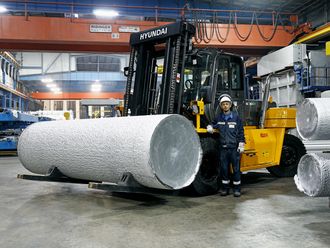
Some of France’s largest companies are preparing a rebellion to counteract a law passed by the country’s socialist government to automatically award double voting rights to long-term shareholders.
Investors, and sometimes management, are trying to overturn the implementation of the legislation at a number of upcoming annual meetings, fighting to maintain the “one share one vote” system. The campaign is being led by PhiTrust and has the backing of 19 institutional investors in countries from Germany to the UK and Switzerland that manage 2,300 billion euros in assets.
The fight follows the introduction last year of the Florange law, which automatically grants double voting rights from 2016 to shares registered for more than two years unless two-thirds of shareholders vote to overturn it.
This comes amid a wider European debate over the issue, with amendments to the Shareholder Rights Directive being discussed this year, which would force the bloc’s 28 member-states to allow deviations from ‘one share one vote’.
Double voting systems are designed to reward long-term shareholding and decision making. However, opponents say it does more to preserve the interests of the dominant shareholders — in some cases the state — and can lead to cosy insider relationships and weaker governance.
“The double voting right provision is a protectionist tool used by dominant shareholders to keep control of the company while reducing the rights of the minority shareholders,” says Loic Dessaint, associate director of Proxinvest, the French proxy adviser.
Denis Branche, partner at Paris-based PhiTrust Active Investors, which has been at the forefront of the investor battle against the legislation, says that the Florange law gives a bad image to the French markets, hurts minority interests and “adversely affects the value of an investment”.
The new legislation has been criticised by management as well as investors. “The only interest of double voting rights is to allow the taking control of companies without having to own a majority of the shares,” Xavier Huillard, chief executive of concessions and construction company Vinci, said in a Bloomberg interview.
Analysts also say the harm outweighs any positive benefits. “Double voting can have a negative impact on stocks, it’s not a good thing,” says Matthias Desmarais, head of equity research at Oddo Securities.
Proxy investor companies such as ISS and Proxinvest have all recommended French companies vote against the rule, along with the French Asset Management Association. As a result of this pressure, 11 of France’s largest companies will attempt to reject the double voting law during the 2015 AGM season, including BNP Paribas, Credit Agricole, L’Oreal, GDF Suez, Vinci, Renault and Vivendi.
This is the majority of France’s largest companies who do not already have double voting rights in place. Twenty-two companies in France’s blue-chip CAC 40 index already have some form of double voting rights.
Last week, 99.3 per cent of shareholders at Vinci approved a resolution preserving the one-share one-voting right system, overturning the application of the Florange law. But not all will be so easy. A vote to keep one share one vote needs a two-thirds majority to pass, and in many cases it will be blocked by the state or other large shareholders.
The French government bought 1.23 billion euro worth of shares in Renault on a short-term basis to give it the firepower to vote down a proposal to keep the one share one vote system on April 30.
This means that the state, which had owned about 15 per cent of Renault, will gain a more powerful voice in the company and will shore up its control of a key French industrial icon. The Renault board later met to discuss both the move by the state and potentially ways in which they could fight back.
The state is also looking to block attempts to keep the one share one vote rule at GDF Suez’s AGM on April 28. Gerard Mestrallet, chief executive of GDF Suez, and a critic of the double voting system, says he is powerless to stop it. “The resolution [to keep one share one vote] will probably be rejected,” he adds.
However, it is not always the government voting to make sure the double voting laws come into effect. Major shareholders are also looking to strike down attempts by institutional investors to reverse the adoption of the Florange law.
Vincent Bollore, the billionaire French corporate raider who owns about 12 per cent of Vivendi, wanted to push through double-voting rights at Vivendi at the AGM to give him greater control of the group. Peter Schoenfeld, whose P. Schoenfeld Asset Management owns about 1 per cent of Vivendi and has just ended a dispute with Bollore over dividends, said he will join Bollore in voting against PhiTrust’s resolution.
But PhiTrust says it is supported by shareholders representing 2 per cent of the capital in the company, including the California Public Employees’ Retirement System, and are continuing to fight.
Despite much institutional shareholder opposition, double voting has been a growing trend in Europe. In Italy, following legislative changes implemented in 2014, a number of companies have introduced double voting rights.
Supporters say that many countries such as the US and Sweden have long had double voting systems, and it works well. “Long-term shareholders can provide stability for companies to act in a long-term way,” says Alan Brett, head of governance ratings research at MSCI, highlighting that there were potentially some benefits.
However, he added that there were better ways to encourage long-term shareholding than double voting rights, such as the UK model of signing up to stewardship codes, which he says encourages shareholders to “challenge boards via oversight and engagement”.
— Financial Times











